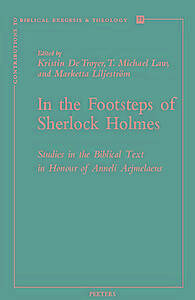
- Retrait gratuit dans votre magasin Club
- 7.000.000 titres dans notre catalogue
- Payer en toute sécurité
- Toujours un magasin près de chez vous
- Retrait gratuit dans votre magasin Club
- 7.000.0000 titres dans notre catalogue
- Payer en toute sécurité
- Toujours un magasin près de chez vous
In the Footsteps of Sherlock Holmes
Studies in the Biblical Text in Honour of Anneli Aejmelaeus
84,00 €
+ 168 points
Description
The book contains a preface by the Three (editors) and has five sections - all befitting the recipient of this Festschrift with her interest in Septuagint and Textual Criticism. The first part of the book, entitled The Septuagint. Origins and Translations contains articles on what a translator is and does (such as the contribution from Benjamin G. Wright and Joachim Schaper) or how LXX Genesis functions as the first translation of Scripture (Emanuel Tov) and contains numerous articles on idioms and accuracy (John A.L. Lee), on lexical variation (Arie van der Kooij) and on renderings of nouns (Benedicte Lemmelijn), verbs (Anssi Voitila), tenses (Raimund Wirth), semi-prepositions (Raija Sollamo), particles (Michael N. van der Meer) or lexical expressions and themes such as the end of times (Staffan Olofsson) or labouring women (Takamitsu Muraoka), etc. In the second part, entitled The Septuagint and the Versions. Textual Criticism and Text History, the books that are focused on are Samuel and Kings (with contributions by Jan Joosten, Philippe Hugo, Zipora Talshir, Siegfried Kreuzer, Andres Piquer Otero, Pablo Torijano Morales, Juha Pakkala, Christian Seppanen) and Joshua (with contributions by Seppo Sipila and Julio Trebolle Barrera). Then, there are also studies on textual issues and text history of Isaiah (Anna Kharanauli), Ezechiel (Johan Lust), Job (Claude Cox), Ecclesiastes (Peter J. Gentry) and Minor Prophets (Hans Ausloos). The third part of this volume is entitled The Septuagint in New Testament and Christian Use and contains two contributions on textual links between LXX and the New Testament (contributions by Tuukka Kauhanen and Georg A. Walser) and patristic texts (contributions by Reinhart Ceulemans and Katrin Hauspie, ). A fourth part of the volume is devoted to The Septuagint in Jewish Tradition (with contributions on how the Tabernacle Account was received in Hellenistic Judaism by Alison Salvesen and 'Seeking the Septuagint in a Scroll Dependent World by Robert A. Kraft). The final part of the volume is dedicated to The Hebrew Bible and the Dead Sea Scrolls. It opens with an attempt by Martti Nissinen to answer the question: 'Since when do Prophets Write?' Then, there is the contribution by George J. Brooke who offers a variant on the issue of variant editions, albeit from the perspective of the scrolls. Eugene Ulrich explores the fine balance between intentional variants and isolated insertions in 4QSama and the MT. Sarianna Metso offers an article on the Leviticus traditions at Qumran and Jutta Jokiranta offers a reflection on 'the stranger' in the Hebrew Bible and the Dead Sea. The contribution by Hanne von Weissenberg forms a nice inclusion with the opening contribution by Benjamin G. Wright as it too focuses on Authority.
Spécifications
Parties prenantes
- Editeur:
Contenu
- Nombre de pages :
- 765
- Langue:
- Anglais
- Collection :
- Tome:
- n° 72
Caractéristiques
- EAN:
- 9789042930414
- Date de parution :
- 22-04-14
- Format:
- Livre broché
- Format numérique:
- Trade paperback (VS)
- Dimensions :
- 147 mm x 229 mm
- Poids :
- 1088 g

Les avis
Nous publions uniquement les avis qui respectent les conditions requises. Consultez nos conditions pour les avis.





